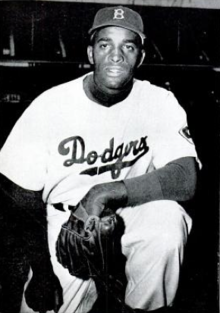Joe Black
| Joe Black | |||
|---|---|---|---|
 |
|||
| Pitcher | |||
|
Born: February 8, 1924 Plainfield, New Jersey |
|||
|
Died: May 17, 2002 (aged 78) Scottsdale, Arizona |
|||
|
|||
| MLB debut | |||
| May 1, 1952, for the Brooklyn Dodgers | |||
| Last MLB appearance | |||
| September 11, 1957, for the Washington Senators | |||
| MLB statistics | |||
| Win–loss record | 30–12 | ||
| Earned run average | 3.91 | ||
| Strikeouts | 222 | ||
| Teams | |||
| Career highlights and awards | |||
|
|||
Joseph Black (February 8, 1924 – May 17, 2002) was an American right-handed pitcher in Negro League and Major League Baseball for the Brooklyn Dodgers, Cincinnati Redlegs, and Washington Senators who became the first black pitcher to win a World Series game, in 1952. Black died of prostate cancer at age 78.
A native of Plainfield, New Jersey, he starred at Plainfield High School. Black attended on a baseball scholarship and graduated from Morgan State University in 1950 and later received an honorary doctorate from Shaw University. He was a member of Omega Psi Phi fraternity. He appears prominently in Roger Kahn's classic book, The Boys of Summer.
Black helped the Baltimore Elite Giants of the Negro Leagues win two championships in seven years. He and Jackie Robinson pushed for a pension plan for Negro League players and was instrumental in the inclusion of players who played before 1944 Black then played for a year in the Brooklyn Dodgers' minor league system.
The Dodgers promoted Black to the major leagues in 1952 at 28, five years after teammate Jackie Robinson broke baseball's color barrier. He roomed with Robinson while with Brooklyn, and was dominant out of the bullpen, chosen Rookie of the Year after winning 15 games and saving 15 others for the National League champions. He had a 2.15 ERA but, with 142 innings pitched, fell eight innings short of winning the ERA title.
...
Wikipedia
